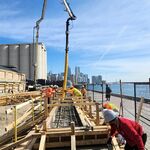W. K. Lis
Superstar
I just can't see trolley buses being a smart investment. They don't have the 'cool' factor that streetcars have which helps to attract extra choice riders, they are heavily restricted as to where they can drive, the cost of electricity seems to be rising even faster than the price of gasoline, and they definitely don't offer increased capacity over regular buses. There would be no savings in terms of drivers, a need for massive investment in new infrastructure and garage retrofits, and there would be yet another different type of vehicle for the TTC to maintain. Bad, bad investment.
From Statistics Canada:
Between December 2009 and December 2010, gasoline prices increased 13.0%, after increasing 7.2% in the 12 months to November. Excluding gasoline, the Consumer Price Index (CPI) rose 1.8% in December, identical to the increase recorded in November.
In addition to paying more for gasoline, consumers paid 6.2% more for electricity and 9.2% more for natural gas in December. Overall, energy prices rose 10.5% during the 12 months to December.
Gasoline and diesel prices rose higher in 2010 than electricity prices. I'm not a fortune teller, but I think the first 3 months of 2011 might end up with gasoline and diesel prices going higher up than electricity prices as well.




